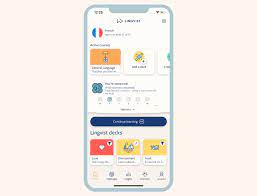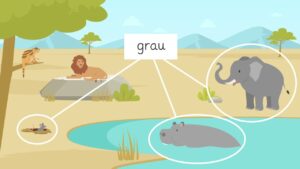German Subjunctive for Beginners
If you're learning German, I bet you’re struggling with its Subjunctive Mood. If not, you're my hero. As complex as German already is, its subjunctive forms are a nightmare. The good news is there are only two.
In this article, I'll explain German Konjunktiv I (the Present Subjunctive or Base Subjunctive) and Konjunktiv II (the Past Subjunctive or General Subjunctive). The former is used in direct speech, while the latter enables us to speak about hypothetical situations. Structured as a dialogue between a German native teacher (Birgit) and her English native student (Alex), this text covers the key rules of the German Subjunctive Mood with examples.
Konjunktiv I or er habe
- Hello, Alex! Great to see you again. Welcome to today’s class on the German Subjunctive Mood.
- Is it even a good morning, then? Just kidding. Nice to see you, Birgit.
- Don't worry. The subjunctive devil is not as black as it’s painted. You’ll leave today’s session with a real mastery of subjunctive forms. Let's first draw parallels between German and English. Konjunktiv I (or Present Subjunctive) largely corresponds to the English Base Subjunctive. In English, you’d expect a subjunctive verb after expressions like She recommended that (I be a better student) or The judge ordered that (he stay in prison for another year).
- Hm... I never thought of that as a subjunctive form.
Is It Anna male vs Anna malt?
- We tend to overlook the grammatical complexities of our mother tongue, don’t we? Anyway, to use direct speech and introduce indirect discourse in English, you need the Indicative Mood: He says Anna paints a lot (from his perspective of “Anna paints a lot”). You'd probably have an urge to translate that as Er sagt, daß Anna viel malt (from Er sagt: “Anna malt viel”). It's incorrect.
- I’m always using it this way, and Germans understand me just fine.
- We do. But you sound like a babbling child to us. The correct version is Er sagt, daß Anna viel male. You also need to use subjunctive verbs in the indirect discourse. You see, Germans are pretty cautious about correcting someone else’s speech. The Subjunctive Mood lets us remain neutral and not feel responsible for guaranteeing the correctness of the statement.
Present tenses: er seie klug
- I know you like visuals, Alex. So, I'll first provide you with a conjugation table for the subjunctive forms of zu malen and then another table for its indicative forms.
- Right. Germans are always making conjugation complex.
- Don’t be whining! Conjugation is your strength. So, here it is for the zu malen (to paint) verb.
Table #1
| Person | Singular | Plural |
| 1st | ich male | wir malen |
| 2nd | du malest | ihr malet |
| 3rd | er/sie/es male | Sie /sie malen |
As you can see, the subjunctive verb differs from the indicative verb only in the second and third person singular and the second person plural. You can compare the two:
Table # 2
| Person | Singular | Plural |
| 1st | ich male | wir malen |
| 2nd | du malst | ihr malt |
| 3rd | er/sie/es malt | Sie /sie malen |
- I see. I should mind the "e" in inflections. I'm wondering what happens in the other tenses. Do these rules change? I’m sure they do. It's German, after all.
- I’ll get to this point after you give me an example. I’m a teacher, so it's my job to check your understanding.
- Not just a teacher – a German teacher. Ok. Would this one work: Birgit sagt, daß ich …Wait, what would I do with the to be verb? It’s not Birgit sagt, daß ich bin…, so? The table only works for weak verbs, not strong verbs. Right?
- Well, both strong verbs and weak verbs take on the same pattern. As long as you know the indicative verb form, you’re fine. Even zu wissen follows this pattern and has the same endings (ich wisse / du wissest / er, sie, es wisse / wir wissen / ihr wisset / sie, Sie wissen). You only need to learn how the to be / zu sein auxiliary verb works.
- Gee! German grammar is torture. Just give me another table. I know you want to.
- You’re making it sound worse than it is. Ok, see Table #3:
Table # 3
| Person | Singular | Plural |
| 1st | ich sei | wir seien |
| 2nd | du seiest | ihr seiet |
| 3rd | er/sie/es sei | Sie /sie seien |
You’re right. Zu sein is easy. I’m not even being sarcastic this time. Then, my sentence would be Birgit sagt, daß ich ihr bester Student seie.
- You're my best student indeed, Alex. The most modest one as well, I think.
- Ich bin bescheiden, das stimmt aber. What about modal verbs? I bet there’s something special about them.
- Wrong. You just have to follow the same rules. Here's a good video example featuring Angela Merkel, where the interviewer answers your question: Sie haben ja gerade erwähnt, daß Sie sehr viel reden müssen…
Example #1

https://flyinglanguages.com/?post_type=videos&p=7016660&preview=true
- Wow! I'm watching politics in German. I never saw that coming.
Past tenses: ...daß ich Deustch gelernt habe
- Let’s now jump to the past tenses with Konjunktiv I. The good news is the rule stays the same; you only need another form for the subjunctive verb. That works the same in English. Here's a sentence: Lena said, “He painted a lot” – Lena said that he had painted a lot. In German it sounds like this: Lena sagte: “Er malte viel“ – Lena sagte, daß er viel gemalt habe. I think it is perfectly clear. So, it’s your turn to build one, Alex.
- Ok, you take the past participle of the verb and add the subjunctive form of zu sein or zu haben, the auxiliary verbs. That’s not difficult. Es wurde berichtet, daß Alex Deutsch gelernt habe.
- Superb! Hast du auch. Shall we transit to the future tenses?
- Do I have a choice?
- No, you don’t.
Future tenses: daß ich Deutsch sprechen werde
- Now, it's time to look into the future. Sounds ominous, right?
- Let me guess. I’d need the zu werden verb. Right?
- Yes, Alex. You’re smarter than I thought.
- Meine Lehrerin sagt, daß ich klug seie. I’m so proud of myself!
- You should be. Back to business. For future tenses, you have to remember the conjugation of zu werden, which serves as an auxiliary verb. Add an infinitive, and voilà – you’ve got yourself a perfect German Subjunctive.
Table # 4
| Person | Singular | Plural |
| 1st | ich werde | wir werden |
| 2nd | du werdest | ihr werdet |
| 3rd | er/sie/es werde | Sie /sie werden |
- So, my smart student. I think you have a sentence ready.
- You believe in me more than I do myself, Birgit. I do have a great sentence: Birgit sagt, daß ich bald fließend Deutsch sprechen werde.
- Es stimmt, sage ich, Alex. Now, some great news for you. Unlike in English, you don’t need any tense agreement. Even when your main clause features a past tense verb, it doesn’t influence the tense of your subjunctive verb: Birgit sagte, daß ich bald fließend Deustch sprechen werde.
- We’re done with Konjunktiv I. Right?
- Two more tiny things.
- Oh no!
Konjunktiv I and Gott sei dank
- You know those fixed expressions like Long live the Queen! or God Bless America! Germans use the Subjunctive Mood to express similar wishes too: Lang lebe die Königin! / Gott segne Amerika! Finally, we use Subjunctive for recipes. While you'd normally use the Imperative Mood in English, we go for Man koche / man nehme Wasser.
- I see. Man nehme heißes Wasser und koche eine Tasse Kaffee. Otherwise, I’ll not be processing information any more. I need some fuel.
- Ok, Alex. Let’s have some coffee. You deserve eine kleine Kaffeepause.
FAQ: Is subjunctive same as conjunctive?
What's called subjunctive in English is known as conjunctive ("Konjunktiv') in German. In essence, they're similar, and you can speak about the German Subjunctive if you're explaining this mood in English. The German language has two types: Subjunctive I (Konjunktiv I) and Subjunctive II (Konjunktiv II), each with its specific rules of use.
Konjunktiv II or the General Subjunctive
- To start talking about Konjunktiv II, also known as Past Subjunctive, we need a small reference to Konjunktiv I (Present Subjunctive). Do you still remember which verb form we use to make subjunctive verbs for it? It's infinitive. For Konjunktiv II, we use the simple past form as the base. It means you’d need to go over some strong verbs to make sure you know their conjugation.
- Oh, that’s my favorite [not].
Present tenses: Wenn ich eine Superkraft hätte
- Don’t worry too early, Alex. There’s both good and bad news in that. On the positive side, you’ll only need to study conjugation for some irregular verbs as the rest are identical with their indicative simple-past forms. With that, you also have a negative side though. Since these forms would mostly coincide, you’d need the context to recognize the subjunctive meaning.
- Don’t you always tell me German is the most logical language in the world?
- I do, and it is. Konjunktiv II or the General Subjunctive in German is, in many ways, similar to the English Conditional Mood. Let me immediately provide you with an example so you don’t become angry with me and my language, lol.
- You’d better hurry up.
- Ok. The most common type is the one corresponding to the English 2nd Conditional: If I wanted coffee, I would make one – Wenn ich Kaffee wollte, machte ich einen. In this case, the zu machen verb is in its past tense form aka subjunctive one.
- How come you call it ‘the present tense form’? Aren’t we using past forms here?
- That’s the tricky part. You need to think about the meaning. In this sentence, we're referring to the possibility to drink coffee now, not in the past.
- Darn it, it’s the same in English. I’ve just never thought of it this way.
- True. We tend to disregard many complexities of our native language while picking on those of a foreign one. Back to Konjunktiv I: weak verbs have the same form as the past form, and the strong ones take on umlauts (as in ich käme for ich kam or du wärest for du warst). Here’s another table for your convenience:
- I think that’s like the tenth table today.
Don’t exaggerate, Alex. It’s the fifth one. I’ll just list a few verbs here. Too many tables scare you off.
Table # 5
| Person | Singular | Plural |
| 1st | ich wäre / hätte / käme | wir wären / hätten / kämen |
| 2nd | du wärest / hottest / kämest | ihr wäret / hättet / kämet |
| 3rd | er/sie/es wäre / hätte / käme | Sie /sie wäre / hätte / kämen |
- Let’s check this video as an example, please:
Example #2

https://flyinglanguages.com/videos/welche-superkraft-hattest-du-gerne-i-bubblez-english-us/
- Wenn ich eine Superkraft hätte, wollte ich Deutsch mühelos lernen.
- That would be a real superpower. They answer a similar question in the next video: Was wäre, wenn du einen Tag jemand anderes sein könntest? Could you answer it as well?
Example #3a

https://flyinglanguages.com/videos/ich-ware-gerne-donald-trump-1live-was-warewenn-english-us/
Example #3b

https://flyinglanguages.com/videos/ich-ware-gerne-donald-trump-1live-was-warewenn-english-us/
- I love this latter idea. But Wenn ich einen Tag jemand anders sein könnte, wäre ich gerne Elon Musk. And you, Birgit?
- Ich auch.
- We click, that's what makes us such a good team.
Polite requests or Ich hätte gerne eine Pause
- We also use the hätte verb to soften requests, like in I would like to have a coffee, please, or like here:
Example #4

https://flyinglanguages.com/videos/ich-brauchte-noch-benzin-knallerfrauen-mit-martina-hill-english-us/
- Ich hätte gern eine Superkraft, Deutsch fließend zu sprechen. It seems truly impossible at times. Ich brächte mehr Fleißigkeit dazu.
Past tenses: Wäre ich in Deutschland geboren...
- Similar to the Base Subjunctive, the General Subjunctive has three forms: present, past, and future. While you have habe gemalt / seie gereist in the former, you will have hätte gemalt / wäre gereist in the latter. This form corresponds to the English 3rd Conditional: If I had not been busy, I would have gladly visited you – Wenn ich nicht beschäftigt gewesen wäre, hätte ich dich gerne besucht. As in English, you can use inversion in this case: Had I not been busy,… – Wäre ich nicht beschäftigt gewesen,…
- It sounds too easy to be true.
- You're just reaching a higher level.
- I’m blushing... What about Mixed Conditionals in German? I mean, I’d say, If I had moved to Germany as a child, I would speak German now.
- That works the same in German: Wenn ich als Kind nach Deutschland umgezogen wäre, könnte ich jetzt Deutsch sprechen.
Future tenses or Mich würde interessieren...
- Now, the German würde construction, similar to the English would, is a predominant way of forming Konjunktiv II, especially in colloquial speech. You’ll hear it a lot in spoken language. So, let’s start with your favorite table for the zu werden conjugation. Please mind that this form is almost always interchangeable with the subjunctive past form, but it's far more common. You're more likely to hear Wenn ihr mehr Geld hätte, würde ich viel reisen than Wenn ihr mehr Geld hätte, reiste ich viel. Both are correct though.
Table #6
| Person | Singular | Plural |
| 1st | ich würde | wir würden |
| 2nd | du würdest | ihr würdet |
| 3rd | er/sie/es würde | Sie /sie würden |
- Würde sounds easy to use.
- It is. You can also resort to it for a polite expression of interest (I would like to know / I would be interested in), like in this piece: Mich würde mal interessieren, was sagen Sie den jungen Menschen.
Example #5

https://flyinglanguages.com/?post_type=videos&p=7016660&preview=true
- If you can bear with me for five more minutes, you’ll become an expert in the German Konjunktiv.
- Well, if that’s the case, Birgit….
More uses of Konjunktiv II: als ob du krank wärest
- You’d use Konjunktiv II to express an unreal condition, like with the English as if. In German, you have als ob and als wenn (as demonstrated in the video excerpt below): Das scheint aber nicht, als ob es geklappt hätte.
Example #6

https://flyinglanguages.com/?post_type=videos&p=7016660&preview=true
- Can you now try it with You look as if you were ill?
- Why would I say that to you? You look fantastic.
- Thanks, but keep that for our class on flirting. Focus on the Subjunctive Mood for now.
- You're boring. Beautiful but boring. Du siehst aus, als ob du krank wärest. This one as well: Du siehst auch aus, als ob du langweiling wärest.
- Whatever, Alex. I only care if the grammar works well... Another special case is the German wenn nur for the English if only. You know that poetic way of talking about things: If only I had more friends! - Wenn ich nur mehr Freude hätte!
- Or Wenn meine Deutschlehrerin nur nicht so streng wäre!
- Me? Strict?
- I’m joking, Birgit. You’re the best.
- Thanks, Alex. Last but not least, you can always use Konjunktiv II to express various kinds of wishes, like Ich wünschte, ich könnte deine Gedanken lesen.
- I also have one: Wenn meine Beispiele nur immer richtig wären!
- Alex, you’re impressing me today. My compliments!
FAQ: How do you use the Subjunctive 2 in German?
The German Subjunctive II (Konjunktiv II) is used for wishes and hypothetical situations. In German, you expect a verb in the subjunctive form if you have the subordinate clause starting with "wenn" (if) and the main clause starting with "dann" (then).
All Subjunctive II verbs in German derive from the verb's simple past tense forms, unlike the Subjunctive I verbs that are based on the infinitive form.
Folge Alex und Birgit!
Have you enjoyed learning German with these two? Birgit is fun although Alex blames her for being boring. Well, Alex is also smarter than he wants to appear. Follow their humorous dialogues and see their teacher/student friendship grow with every class. Wenn ich du wäre, würde ich den beiden unbedingt folgen.
As complex as German grammar may look at first, it gets easier with practice, I promise. That's it for today. I hope this article was helpful and enjoyable. Wir sehen uns bald!






